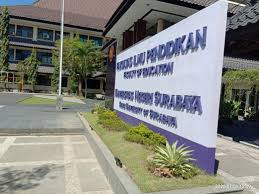SEJARAH
The Undergraduate Program of Psychology (UPP), Faculty of Education (FIP) of Universitas Negeri Surabaya (Unesa) was established on January 29, 2007, based on a permit from the Directorate General of Higher Education (DIKTI) number 172/DT/2007. The letter was renewed in 2010 Decree of the Chancellor of Unesa on behalf of DIKTI, number 2080/D/T/KN/2010. At its inception, the Psychology Study Program was running under the Department of Educational Psychology and Guidance of FIP. Over time, the UPP stood as a separate program under FIP based on considerations to the Decree of the Directorate General of Higher Education of the Republic of Indonesia No. 163/Dikti/Kep/2007 concerning Arrangement and Codification of Study Programs in Higher Education. In the decree, the UPP is clustered in the Psychology Sciences group, while Counselling and Guidance is included in the Educational Sciences.
The establishment of the UPP was also served as a response to the increasing community's demand for psychological services in mental health, industry and organization, education, and social affairs. Based on the needs and demands of the community, the UPP established psychology education that facilitates several fields of psychology, namely Educational and Developmental Psychology (PPP), Clinical Psychology (PK), Industrial and Organizational Psychology (PIO), and Social Psychology (PS).
Along the years, the improvement of the quality of psychology education services held, was recognized by the government as rated B with the national accreditation (SK BAN-PT no.0214/SK/BAN-PT/Akred/S/1/2017) in 2017. Currently, the UPP has 18 permanent lecturers, almost all of whom have lecturer certification. Five lecturers hold doctoral degrees and the rest hold master's degrees graduated from leading universities from within the country and abroad. As many as 94% of psychology department lecturers are lecturers with an average age of 27-47 years. Relatively young lecturers have the potential for self-development and high performance. For daily management, the Undergraduate Program of Psychology has two staff to help run the academic activities.
The Psychology Study Program, State University of Surabaya, was officially established on January 27, 2007, under the Faculty of Education. Surabaya State University is a university with a strong educational color, because it comes from a teacher education institute. The color also gives quite a big influence on the Unesa Psychology Study Program, plus it is a new study program under the Faculty of Education.
The background for the emergence of the Psychology Study Program is as follows:
1. The beginning of its establishment was an effort to answer the challenges and requests of the community who wanted psychological services, especially to serve schools. Initially, the activities of the Psychology Study Program collaborated or were involved with schools and the Education Office. These activities include selecting new students, selecting talented students (Cerdas Istimewa Berbakat Istimewa) for acceleration programs and superior classes, as well as talent interest tests for majors according to school requests, to assisting in the selection of school principals and school supervisors.
2. Initially, teaching staff with an educational background in Psychology were recruited and taught at the Counseling Guidance Study Program, as well as teaching subjects such as General Psychology, Personality Psychology, Development of Non-Test Measurement Tools, Basic Communications, and Educational Psychology. Some of these courses have now changed names. In its development, the need to provide psychological services as well as the need to have teachers who have deeper psychological competence has become stronger. Therefore, the idea arose to establish a Psychology Study Program. Based on this idea, several teaching staff with an undergraduate education background in Guidance and Counseling were asked to continue their master's education in Psychology.
3. Finally, after the minimum required resources are adequate, the establishment of a Psychology Study Program is proposed, which is answered with a letter of permission from the Directorate General of Higher Education (DIKTI) number 172/DT/2007 issued on January 29, 2007. The letter was renewed in 2010 based on Decree of the Chancellor of Unesa on behalf of DIKTI number 2080/D/T/KN/2010. At that time, the Psychology Study Program had a total of 11 teaching staff, namely 1 Professor in the field of Educational Psychology, 1 Psychologist, 4 Masters of Psychological Science, of which 3 had an educational background of S1 Guidance and Counseling, and 5 S1 Psychology, with 1 degree Dra.
4. In 2012, this program has been accredited by BAN PT which is valid until August 2017 with a grade of C. This is reasonable, because it is the first accreditation of Psychology Study Program, which in terms of infrastructure, and human resources are still lacking. In its development, now the Psychology Study Program has 17 permanent teaching staff, of which 6 of them are currently pursuing doctoral education. This study program also has 10 Psychologists, consisting of the fields of Education, Organizational Industry, and Clinical.
With the passage of time, slowly the study program has shown an improvement. Along with this, the following problems arise.
1. Based on the Decree of the Directorate General of Higher Education of the Ministry of National Education of the Republic of Indonesia Number 163/Dikti/Kep/2007 concerning the Arrangement and Codification of Study Programs at universities (attached) S1 Psychology is included in the Psychological Sciences group, while Educational Psychology and Guidance (Counseling Guidance) included in the clump of Educational Sciences.
2. Psychology Study Program differs from PPB/BK in terms of field of work. If PPB and BK are specifically engaged in the scope of schools, then Psychology graduates can enter the world of work in the industrial, clinical, educational, and social fields. Therefore, the preparation of these graduates requires a different learning experience.
3. In 2015, BAAK Psi Unesa noted that there were 2405 registrants for the Psychology Study Program at Unesa from various registration channels, placing the Psychology Study Program in the 4th highest ranking of the most popular in the social and social sector. Meanwhile, the current capacity of the Psychology Study Program is only about 80 people. In order to increase the student's capacity to absorb a larger number of applicants, the Psychology Study Program requires more adequate infrastructure and resources.
4. The large number of active students at this time also requires an increase in better services, in terms of learning and other administrative services.
5. More and more interest from outside institutions and institutions who want to collaborate with Unesa Psychology Study Program in various fields.
Legal Foundation
1. Decree of the President of the Republic of Indonesia Number 93 of 1999 concerning the change in the statute of IKIP Surabaya to become the State University of Surabaya
2. The 1945 Constitution of the Republic of Indonesia
3. Law no. 17 of 2003 concerning State Finance
4. Law no. 20 of 2003 concerning the National Education System
5. Law no. 15 of 2004 concerning Audit of State Finance Management and Accountability
6. Law no. 25 of 2004 concerning the National Development Planning System
7. Law no. 32 of 2004 concerning Regional Government
8. Law no. 14 of 2005 concerning Teachers and Lecturers
9. Law no. 17 of 2007 concerning the National Long-Term Development Plan (RPJPN) 2005-2025
10. Law no. 43 of 2007 concerning Libraries
11. Law no. 25 of 2009 concerning Public Services
12. Government Regulation No.19 of 2005 concerning National Education Standards
13. Government Regulation No. 74 of 2008 concerning Master
14. Government Regulation No. 37 of 2009 concerning Lecturers
15. Government Regulation Number 17 of 2010, concerning Management and Implementation of Education
16.Permendiknas Number 24 of 2007 concerning Standards of Facilities and Infrastructure
17. Permendikbud Number 49 of 2014 concerning National Standards for Higher Education
18.Renstra of the Ministry of National Education 2010-2014 19.STATUTA State University of Surabaya
LAB
- PSYCHOLOGY LABORATORY MANAGAMENT
- PSYCHOLOGY LABORATORY SERVICE
PROGRAM STUDI
MISSION |
1. Producing competent and competitive Bachelor of Psychology graduates 2. Conducting research in the field of psychology oriented to education and human resource development 3. Organizing community service in the field of psychology oriented to education and human resource development 4. Expanding networking and collaboration to improve the educational quality of psychology undergraduate program for the development of human resources |
AIM |
a. Produce competent and competitive psychology graduates b. Publish scientific papers nationally and internationally c. Organizing community service activities in the field of Psychology. d. The realization of strong institutional governance. e. The realization of national and international partnerships in the context of the development and application of Psychology. |
ACHIEVEMENT TARGETS AND STRATEGIES |
To achieve the goals of the Psychology study program, a strategy is formulated with the following stages: 1. To produce competent and competitive Psychology graduates, the achievement strategies carried out are: a. Increasing the promotion of Study Programs outside the East Java region by increasing the public accessibility of Study Programs through the web, brochures, and increasing the role of alumni outside the region, b. Improving the quality of learning/lectures through (1) improving the competence of lecturers through further doctoral studies; (2) updating of learning materials and references once a year; (3) implementing the IQF curriculum and improving SCL-based learning activities (student centered learning) c. Improving student achievement at the national level through increasing student participation in various national and international competitions 2. To publish scientific papers in the field of Psychology at the national and international level with a reputation (accredited), the achievement strategies carried out are: a. Improving the quality and quantity of lecturer research in the Psychology study program through (1) mapping of research umbrellas with a focus on developing specialization in Psychology study programs, namely Educational/Developmental Psychology, Industrial/Organizational Psychology, Clinical Psychology, Social Psychology, and General and Experimental Psychology; (2) sending lecturers to take part in national & international workshops/seminars/conferences 3. The implementation of community service activities in the field of Psychology at the national level, the achievement strategies carried out are: a. Increasing the quantity and quality of lecturer research in the Psychology study program through (1) improvement of PKM proposals at the national level, and (2) increasing cooperation with institutions outside Unesa 4. For the realization of strong institutional governance, the achievement strategies carried out are: a. Implement and improve quality assurance standards b. Implement governance based on ISO 15 standard c. Implement governance based on 7 accreditation standards of BAN PT Psychology Study Program d. Prepare & implement governance based on AUN accreditation (ASEAN level) 5. Having cooperation, organizing joint activities, as well as increasing the field of cooperation at the national and international levels in the context of developing and applying the science of Psychology, the achievement strategies carried out are: a. Increasing cooperation, organizing joint activities, as well as improving b. Established a university-level Applied Psychology Service Center. |
VISION |
To be a leading undergraduate study program with strengths in the study and application of psychology in educationand human resource development |

 MASUK PTN
MASUK PTN